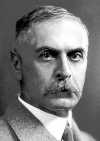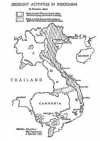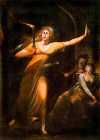 Landsteiner was an Austrian-born American medical researcher who was awarded the 1930 Nobel Prize in Physiology or Medicine for his discovery of the four basic human blood groups—A, B, O, and AB—which enabled the first successful blood transfusion to be performed in 1907. He was also involved in the discovery of the polio virus, and he helped identify the human blood protein known as the Rh factor. In the 1930s, Landsteiner successfully cultured the organism that causes what disease? Discuss
Landsteiner was an Austrian-born American medical researcher who was awarded the 1930 Nobel Prize in Physiology or Medicine for his discovery of the four basic human blood groups—A, B, O, and AB—which enabled the first successful blood transfusion to be performed in 1907. He was also involved in the discovery of the polio virus, and he helped identify the human blood protein known as the Rh factor. In the 1930s, Landsteiner successfully cultured the organism that causes what disease? Discuss
Source: The Free Dictionary
 When negative circumstances align, accidents happen—that’s what British psychologist James T. Reason asserts with his Swiss Cheese model of accident causation, a model used in the risk analysis and risk management of human systems. Essentially, the model, which has been applied to healthcare, aviation safety, and emergency service organizations, states that a system produces a failure when all of its “holes” momentarily line up. What are the four levels of failure set forth by Reason?
When negative circumstances align, accidents happen—that’s what British psychologist James T. Reason asserts with his Swiss Cheese model of accident causation, a model used in the risk analysis and risk management of human systems. Essentially, the model, which has been applied to healthcare, aviation safety, and emergency service organizations, states that a system produces a failure when all of its “holes” momentarily line up. What are the four levels of failure set forth by Reason?  The Pentagon Papers were top secret government documents detailing US involvement in SE Asia from WWII to 1968. In 1971, a former government employee leaked portions of the 47-volume study, which revealed both miscalculation and deception on the part of US policymakers, to The New York Times, which began publishing articles about it. Citing national security, the Justice Department obtained an injunction against further publication, and the case went to the Supreme Court. How did it rule?
The Pentagon Papers were top secret government documents detailing US involvement in SE Asia from WWII to 1968. In 1971, a former government employee leaked portions of the 47-volume study, which revealed both miscalculation and deception on the part of US policymakers, to The New York Times, which began publishing articles about it. Citing national security, the Justice Department obtained an injunction against further publication, and the case went to the Supreme Court. How did it rule?  Shavuot (“weeks”) is the second of the
Shavuot (“weeks”) is the second of the  Agricola was a Roman general responsible for much of the Roman conquest of Britain, where he was made consul and governor after a distinguished military and political career. He pacified most of the territory, conquering North Wales and advancing far into Scotland, and also circumnavigated the island. His biography, the De Vita et Moribus Lulii Agricolae—The Life and Character of Julius Agricola—was the first published work of his son-in-law, what Roman historian?
Agricola was a Roman general responsible for much of the Roman conquest of Britain, where he was made consul and governor after a distinguished military and political career. He pacified most of the territory, conquering North Wales and advancing far into Scotland, and also circumnavigated the island. His biography, the De Vita et Moribus Lulii Agricolae—The Life and Character of Julius Agricola—was the first published work of his son-in-law, what Roman historian?  An estimated 18 percent of the world’s population is prone to sleepwalking. While most cases simply consist of sitting up in bed, there are a number of documented cases of eating, bathing, and even driving and committing murder while sleeping. The sleep disorder is more common in people with high levels of stress and anxiety and among those with a family history of sleepwalking. What tragic Shakespearean character, wracked with an overwhelming sense of guilt, is driven to sleepwalk?
An estimated 18 percent of the world’s population is prone to sleepwalking. While most cases simply consist of sitting up in bed, there are a number of documented cases of eating, bathing, and even driving and committing murder while sleeping. The sleep disorder is more common in people with high levels of stress and anxiety and among those with a family history of sleepwalking. What tragic Shakespearean character, wracked with an overwhelming sense of guilt, is driven to sleepwalk?